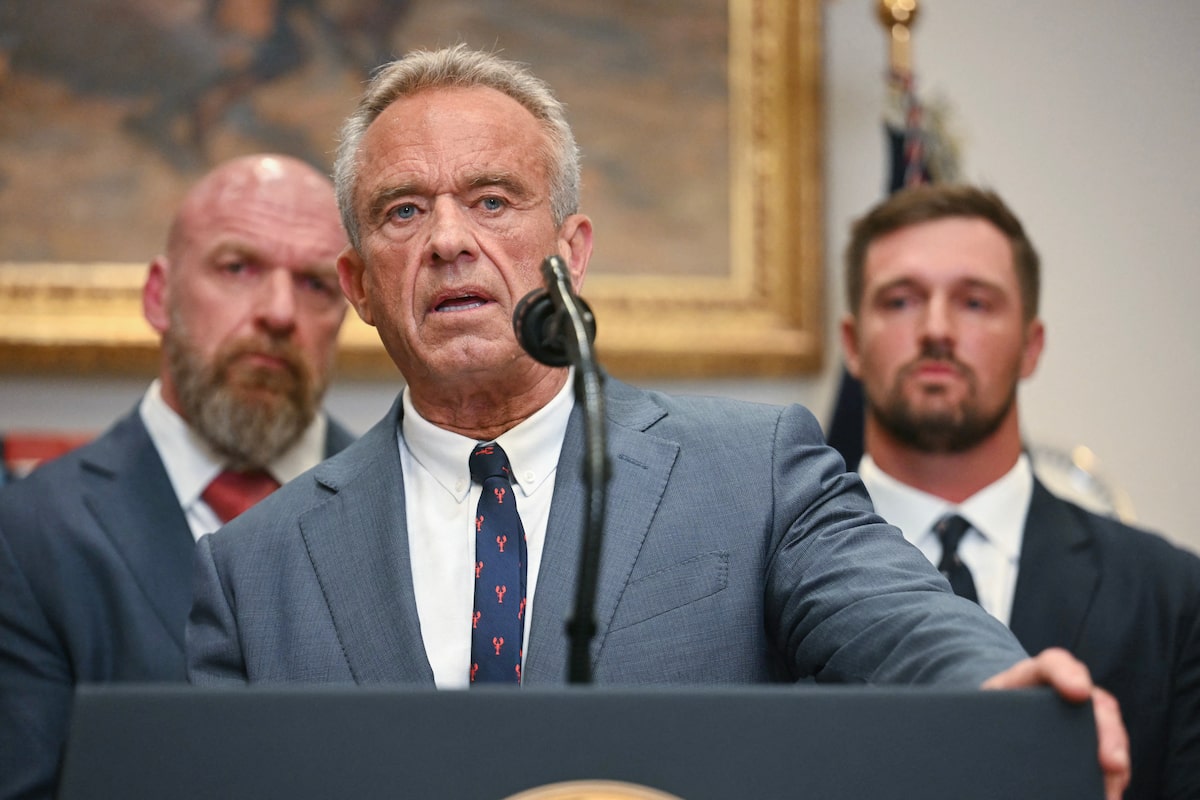U.S. Secretary of Health and Human Services Robert F. Kennedy Jr. in Washington on July 31. Mr. Kennedy has announced plans to terminate nearly US$500-million in funding for mRNA vaccine development.JIM WATSON/AFP/Getty Images
Canadian experts in vaccines and infectious diseases say the decision by the U.S. government to terminate nearly US$500-million in funding for mRNA vaccine development is not just illogical but threatens pandemic preparedness.
U.S. Health Secretary Robert F. Kennedy Jr. announced on Tuesday that 22 mRNA-based projects will be halted and no new projects will be green lit. He claimed data show these vaccines “fail to protect effectively against upper respiratory infections like COVID and flu.”
Vaccine specialists on both sides of the border have stressed that mRNA technology is safe and effective, in addition to being a necessary tool to prevent future pandemics. While mRNA research will continue elsewhere, Canadian experts said the U.S. cuts will be felt across the global scientific community.
Kennedy’s firing of U.S. immunization committee is worrisome, Canadian scientists say
Pieter Cullis, a biochemist at the University of British Columbia whose discoveries with lipid membranes ultimately provided the delivery system for COVID-19 vaccines, said the decision is “bewildering.”
“This is the most promising technology we have for diseases – rare diseases, infectious diseases, cancer, cardiovascular, you name it,” said Dr. Cullis. “It’s one of the most successful innovations in medicine in the last 10 years or longer and they’re completely ignoring it.”
Mr. Kennedy, a long-time vaccine skeptic, has made a number of changes to vaccine programming in the U.S. Earlier this year, he pulled back recommendations on COVID vaccinations for pregnant women and children. He also turfed the U.S. panel responsible for making vaccine recommendations.
The Health Secretary said on Tuesday that funding will be shifted toward “broader vaccine platforms that remain effective even as viruses mutate.” One of the earlier cuts at the U.S. Department of Health and Human Services, or HHS, was Moderna’s contract to develop a human vaccine for bird flu – a disease of increasing concern.
An mRNA-based Pfizer and BioNTech COVID-19 vaccine. Vaccine specialists have stressed that mRNA technology is safe and effective.Jenny Kane/The Associated Press
Allison McGeer, an infectious-diseases specialist at Mount Sinai Hospital in Toronto, said there is no other word to describe the recent U.S. cuts than “nonsense.”
She stressed that the production and distribution of COVID-19 vaccines, which have saved countless lives, was substantially a U.S. initiative and one that greatly benefitted Canada. But Canada can no longer rely on this partnership for pandemic preparedness.
“There’s just no doubt that this puts an enormous hole in the work that’s going on and, even if everybody else in the world tries to step in, it’s going to be hard to make up this loss,” she said.
Dr. McGeer said there is a lot of important work being undertaken in Canada on mRNA technology and it could be expanded. But while Canada feels the impact of tariffs imposed by Mr. Trump, she’s worried investments in science will decrease.
“I’m undeniably very anxious that we will lose ground in Canada because we’re looking for funding for prevention. Funding for prevention is always hard and even harder in our current economic situation,” said Dr. McGeer.
Mr. Kennedy’s latest comments on vaccines are also fuelling vaccine hesitancy and opposition, said Lynora Saxinger, an infectious-diseases specialist at the University of Alberta. She said the cuts signal the “triumph of disinformation over science.”
Dr. Saxinger said there is already a proportion of the Canadian population that aligns with the U.S. Her concern, however, is for people who are on the fence and could fall victim to disinformation by consuming it frequently.
“The fact that it’s being elevated by the secretary of HHS does make it more likely that people who might not otherwise be paying a lot of attention will see more and more about this and it will undermine their trust in vaccines as well,” she said.
“We’re reaching a point now where I think anything coming out of the U.S. that has to do with science and human health, you have to doubt it.”
The Infectious Diseases Society of America, in a statement on Wednesday, said the recent cuts “are deeply concerning and reflect an alarming pattern of the Administration’s efforts to curtail vaccine research and sow unfounded doubt in vaccine safety and effectiveness.”
With a file from the Associated Press

